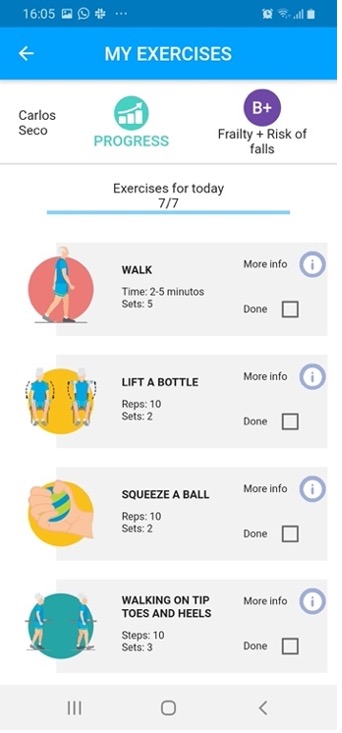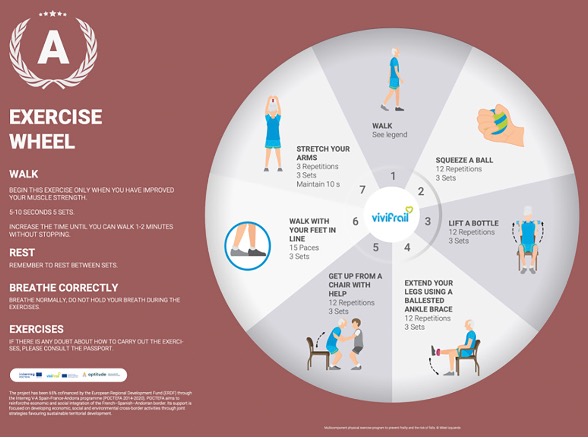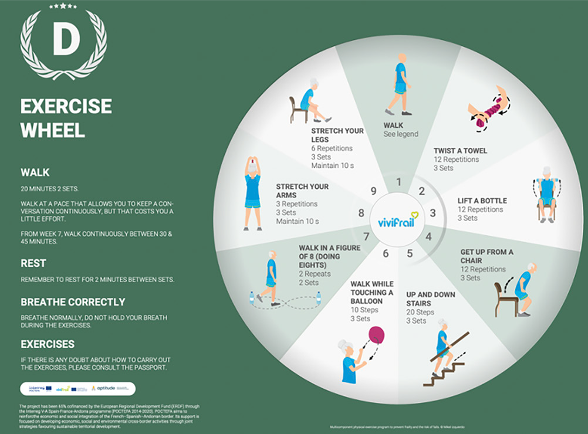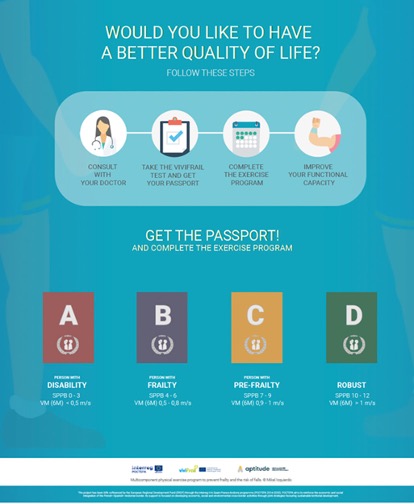Name of the app: VIVIFRAIL: Multi-Component Physical Training Program to prevent weakness and falls in People over 70 years
Category of the mobile application: Health
Platform: iOS (iPhone 4 & above), Android (versions 8.0 & above),
Cost: Free
About the App:
In October 2017, the World Health Organization (WHO) published Integrated Care for Older People: Guidelines on community-level interventions to manage declines in intrinsic capacity (1). These guidelines set out 13 evidence-based recommendations for health and care workers to help develop and carry out person-centred integrated care for older people (ICOPE) at the community level. The ICOPE approach embodies the focus on optimizing intrinsic capacity – loss of mobility, malnutrition, visual impairment, hearing loss, cognitive decline, depressive symptoms – and functional ability as the key to healthy ageing. For those with limited mobility, a multimodal exercise programme should be tailored to suit individual capacity and needs (2) . The Vivifrail project was recommended by WHO as a practical guide to developing a tailored exercise programme.
Vivifrail project is a program for the Promotion of Physical Exercise that is an international reference for community (3) and hospital intervention (4) for the prevention of frailty and falls in older people. It is currently being used by more than 10000 health professionals reaching an impact on the effective population of more than 1 million people across Europe and South America.This international project is based on the idea that health in older people should be measured in terms of its function and not as a disease that determines life expectancy, quality of life, and resources or supports that need in each population. The objective is to maintain a level of functionality that maintains the highest degree of autonomy possible in each case.
The Evidence-based Vivifrail application allows health professionals to classify older people based on their risk of loss of functional capacity, dependence and risk of falls. Once the older participant has been categorized, the App algorithm proposes an individualized tailored multi-component physical training program for the prevention of frailty and falls in people over 70 years old (see www.vivifrail.com/resources). The multi-component physical training program is based on a series of exercises that will allow, depending on the level of functional capacity (i.e. severe limitation, moderate limitation and slight limitation) to develop arms and legs muscle strengthening, balance retraining, flexibility as well as to improve heart health by walking. Following these simple programmes, an older participant can improve functional capacity, as well as avoid fragility syndrome and the risk of falls.
Use in clinical practice:
Pre-frail and frail older adults are particularly vulnerable to the adverse effects of hospitalisation especially functional decline and delirium. In hospital, the supervised tailored multicomponent physical exercise guide Vivifrail (http://vivifrail.com/resources/) has been shown to be safe and effective in attenuating functional decline and preventing cognitive decline (4). The uniqueness and novelty of Vivifrail is that it has individual prescription passports for older adults depending on their functional capacity level (serious, moderate and slight limitation) as evaluated by the SPPB, a walking speed test and the risk of falling which can be implemented during unsupervised sessions (Figure 1 and Figure 2).
Exercise interventions in nursing homes and long-term care facilities improve muscle strength and function (3). These benefits are lost after training cessation, especially in frail elderly patients with dementia after long-term physical restraint. In a recent study (3) on older adults (<75 years) living in nursing homes the Vivifrail multicomponent tailored exercise program was very effective in the short-term (4 weeks) and prevented severe functional decline and strength loss in institutionalized older (i.e. physical frailty reversion and recovery of autonomy). Multicomponent Vivifrail exercise face-to-face interventions would seem advisable as an essential activity to protect older adults from severe functional decline (2).


Figure 1. VIVIFRAIL Multicomponent Physical Exercise Programme to Prevent Frailty and the Risk of Falls. Example of exercise wheels for each functional level that include the exercises, series and repetitions that should be done every week. Available at (www.vivifrail.com/resources). An example of exercise wheel type A (frail) for an older person who can walk with difficulty or help and type D for a robust person. (free download from http://vivifrail.com/resources/). Additionally, an App to perform the Vivifrail Test and to follow the exercise programme corresponding to the degree of frailty and risk of falls is also available on Google Play or the App Store. (© Mikel Izquierdo. Multicomponent program of physical exercise for the prevention of fragility and the risk of falls, 2017)

Figure 2. Poster to promote the participation in the VIVIFRAIL programme of older people who come to centers and consultations. Step by step the way to participate in the exercise programme that best suits the initial functional status is described. Available at (www.vivifrail.com/resources) (© Mikel Izquierdo. Multicomponent program of physical exercise for the prevention of fragility and the risk of falls)
Pros:
- Depending on the older person’s functional capacity level (serious limitation, moderate limitation and slight limitation as evaluated by the SPPB and a walking speed test) and the risk of falling (vivifrail.com) up to six different types of physical exercise programs can be downloaded, which can be implemented during unsupervised sessions (i.e Telemedicine).
- Vivifrail app is a free app translate into English, French and Spanish. Additionally on the vivifrail web page (vivifrail.com/resources) you will find all the information and tools necessary for the individualized prescription of a multicomponent programme of physical exercise translated into: English ,French, German, Italian, Portuguese, Swedish, Polish, as well as Traditional Chinese.
- It allows to standardize and monitoring the multicomponent exercise programme in an agile and fast way in centers such as nursing homes. It also makes it easier for a family member and / or caregiver to help and control the study participants.
- It allows to organize groups of participants in a comfortable and easy way and to better monitor them when checking that they are meeting the objectives.
- The course system can motivate many participants to complete each of the treatment cycles, and they can also see the evolution during the tests at the middle and end of the course to guide them.
Cons:
- In serious to moderate limitation older adults with risk of falling, multicomponent Vivifrail exercise face-to-face interventions would seem advisable as an essential activity to protect older adults from severe functional decline.
- An exercise specialist should be involved to ensure proper form and technique, both essential to avoiding injury while strength training.
- Whilst the Vivifrail multicomponent programme can be tailored to individual functional capacities, progression of exercises and intensities could be varied across these individuals that could need more specific recommendations on execise dose (i.e. duration, frequency and intensity).
Conflicts of interest
The authors declare no conflicts of interest.
References:
- Integrated care for older people: Guidelines on community-level interventions to manage declines in intrinsic capacity. Geneva: WHO; 2017 (https://www.who.int/ageing/health-systems/icope/en/ accessed 16 February 2021).
- Izquierdo M, Morley JE, Lucia A. Exercise in people over 85. BMJ. 2020;368. doi:10.1136/bmj.m402
- Courel-Ibáñez J, Pallarés JG, García-Conesa S, et al. Supervised Exercise (Vivifrail) Protects Institutionalized Older Adults Against Severe Functional Decline After 14 Weeks of COVID Confinement. J Am Med Dir Assoc. 2020;0(0):1-5. doi:10.1016/j.jamda.2020.11.007
- Martínez-Velilla N, Casas-Herrero A, Zambom-Ferraresi F, et al. Effect of Exercise Intervention on Functional Decline in Very Elderly Patients During Acute Hospitalization. JAMA Intern Med. 2019;179(1):28. doi:10.1001/jamainternmed.2018.4869
Authors and Affiliations:
Mikel Izquierdo1,2, Fabricio Zambom-Ferraresi1,2, Mikel L Sáez de Asteasu1,2, Nicolás Martínez-Velilla1,2, Robinson Ramirez-Vélez1,2, Antonio García-Hermoso1,2, Alvaro Casas-Herrero1,2, Alan Sinclair3, Leocadio Rodríguez-Mañas2,4
1 Navarrabiomed, Complejo Hospitalario de Navarra (CHN), Universidad Pública de Navarra (UPNA), IdiSNA, Pamplona, Spain
2 CIBER of Frailty and Healthy Aging (CIBERFES), Instituto de Salud Carlos III, Madrid, Spain
3 Foundation for Diabetes Research in Older People (fDROP) and King’s College, London, UK
4 Servicio de Geriatría. Hospital Universitario de Getafe, Getafe (Madrid), Spain
Email: mikel.izquierdo@gmail.com
Twitter handle @mikelizquierdo_
Instagram @mikelizquierdo_